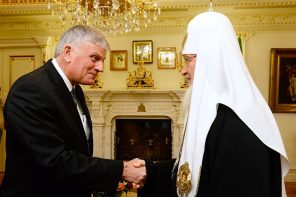Reading Candace Chellew-Hodge’s excellent piece on a newly-released study of the religious left makes me want to add a few thoughts on the subject.
It wasn’t until I read about this study that this made sense, but it’s precisely the communal faith of mainline Protestant denominations that makes me caution political observers about writing them off as irrelevant. It’s true that mainliners are a relatively small chunk of the population—about 12-15%, compared to roughly 25% each for Catholics and Evangelicals—but as the study points out, the communal ideal cuts across denominational lines to some extent. So even though a denomination like the United Church of Christ may only represent a tiny fraction of the overall population, it can still exert a disproportionate influence, because it can provide leadership to many Catholics and even a few Evangelicals.
Perhaps more important, the communal faith translates into a liberal ethos among post-Christian citizens. That fast-growing unaffiliated demographic comes out of the mainline and Catholic churches, much to our chagrin. But they take with them the importance of helping others. So here again, the religious left has more influence than pure numbers might suggest, because we are able to make common cause with people who share our values, if not our beliefs.
The flip side to this story, though, is that the communal faith is hard to bring into the news cycle. For one thing, its advocates (myself included) often preach the church as a community of justice over and against the wider culture. That doesn’t make us sectarian, exactly. But it does mean that we’re apt to work on ourselves before society: we use fair trade coffee, for example, or recycle, or structure our church investments to reflect our values. All of those are stances with public, even political, ramifications, but they’re not the sort of thing that will typically get you on the evening news, much less allow you to build a political base.
Last but not least, faith understood communally acts as a brake on some of the more divisive aspects of current politics. Even though mainliners and Catholics break pretty much evenly between Republicans and Democrats, there is far less support among them than you might suppose for punitive measures against illegal immigrants, or denying basic equalities for gays and lesbians. Why? Because despite how we might feel about immigrants or gays, we believe that strong communities include all comers. To put it another way, the people in my pews may be traditionalists, but they’re pretty tolerant. In today’s climate, that puts them in the center, if not a bit to the left of it, regardless of who they vote for.
To make a long story short, then, politicians who want to look to the religious left to provide them with a margin of victory might be frustrated, despite Pres. Obama’s success. We’re just not organized or vocal enough to do what the Religious Right has done for the Republican party over the years.
But if you’re interested in certain issues—particularly social and economic justice, as the study’s authors suggest—then you’re more than likely going to find the religious left making up a healthy portion of your core supporters. We may never be the flashy people out front, but we’ll be there in the back, addressing the envelopes, copying the fliers, and making the (fair-trade) coffee.




